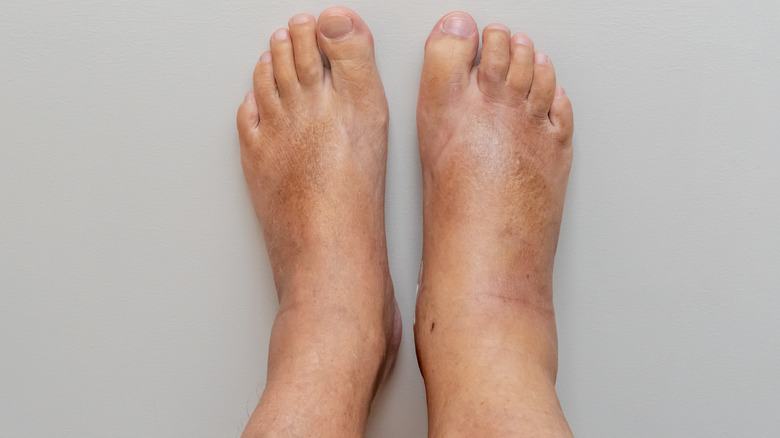The Real Difference Between Inflammation And Swelling
The pain and discomfort associated with the swelling of any body part is impossible to ignore. Whether it's a swollen ankle or enlarged lymph node, it will significantly impact your health and quality of life. But, looking at the enlarged area might make you wonder how you should describe the problem to your health provider — is the ankle or lymph node swollen, or is it inflamed? And is there any real difference?
Swelling and inflammation are medical terms that are so similar they are often used interchangeably, but there are some distinctions between them. Inflammation is an immune system response to an injury, irritation, or infection, in which inflammatory cells are sent to the problem area, where they attack the pathogen or work to heal damaged tissue (via Cleveland Clinic). Inflammation can be acute, meaning that it is the immediate, short-term response to bodily harm (like following a cut or a fall), or it can be chronic, lasting months or even years. Chronic inflammation is a symptom of many serious health conditions, including arthritis, heart disease, and cancer, and, if it continues unchecked long-term, it can progressively damage tissue.
Inflammation can affect a small area or the whole body
Lisa Kluchurosky, ATC, service line administrator for the Sports Medicine Department at Nationwide Children's Hospital, says "Prolonged inflammation and pain can lead to atrophy of the muscles surrounding the joint and a decreased ability to activate the muscles. If not treated appropriately, the swelling can become chronic, or long term. Chronic swelling leads to tissues becoming more rigid and less pliable than their healthy counterpart. Less pliable tissues are more susceptible to further injury."
Swelling, on the other hand, is just any abnormal enlargement of a body part, and it can be due to either inflammation or simple buildup of fluids in the body tissues. Swelling can happen in a small, contained area, or it can affect the whole body (via Medical Academic). Like inflammation, swelling that is prolonged and goes untreated can also lead to serious health complications.
Swelling and inflammation should both be taken seriously, especially if the cause is not easily discernible, if it persists for a long time without getting better, or if it's accompanied by other concerning symptoms. Your doctor can help figure out the underlying cause and offer options for treatment.


